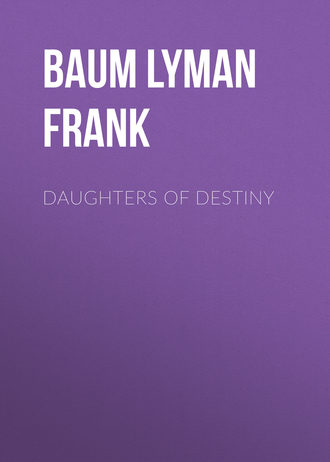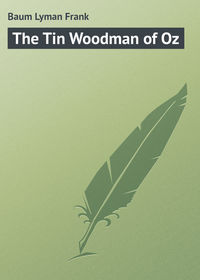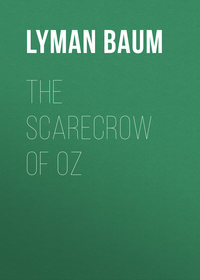 полная версия
полная версияDaughters of Destiny
The last words were spoken with impetuous force, as if evoked by a sudden thought. The lashes that veiled her eyes flickered slightly the accusation, but she made no other movement.
His voice grew stern.
“Tell me, why have you favored a dog of an infidel?”
“I, my father? I favor a dog of an infidel? Are you mad?”
“It has come to my ears,” he said, stiffly. “The young American who came here with Kasam.”
Maie stared at him as if amazed, as in truth she was. Then her head fell back and from her slender throat burst a peal of merriment that was well-nigh irresistible. She sprang up lightly, dropping her outer robe, and cast herself with abandon into the old man’s arms, clinging to his neck and nestling within his lap while her laughter filled his ears like the sweet chime of silver bells.
“Oh, my foolish, ridiculous old father!” she cried, while kissing his forehead and smoothing his beard over her bosom, like a mantle. “Has the serpent of folly bitten you? What monster of Agoum put such dreadful thoughts of your little Maie into your suspicious head? An infidel! Has the Prophet forsaken me? Were I lacking in any modesty – which Allah forbid! – would a daughter of Raab choose an infidel?”
Agahr held her tight, and his heart softened.
“The tale was brought to me, and I could not but doubt,” he said, doggedly. “But I am very glad to find you innocent, my precious one. Forget the words, Maie, for they were inspired by a lying tongue – one that I will tear out by the roots at tomorrow’s sunrise!”
He arose from his seat, clasping her in his arms like a little child, and carried her to a divan, where he gently laid her down. Then he bent over and kissed both her cheeks.
“I must go now,” said he. “Midnight approaches, and I must be at the gate to admit Kasam.”
“You will disguise yourself?” she asked, holding one of his hands as she gazed up at him.
“I shall cover my head with a cloak. Beni-Bouraz is Captain of the Guard, and he must know it is the Vizier who commands him to open. Afterward it will not matter who recognizes me.”
“Be careful,” she cautioned. “We must guard against treachery. Are you sure no one knows our plot?”
“The messenger who returned from Kasam is dead. Yamou attended to him.”
She nodded.
“Then go, my father; and may Allah guide your hand!”
Slowly he turned and without further word left the room. The passage was dark, and he stumbled along, feeling his way, until he came to the draperies that hid his own chamber. Having thrust these aside he entered to find the room well lighted but deserted by even his slaves.
Thoughtfully the old vizier sat at his table and pondered well the scene just enacted within his daughter’s boudoir. While in her presence he had seemed convinced of her innocence; but now the old doubts assailed him anew.
Presently his brow cleared. He reached out his hand and touched a soft-toned gong, and immediately the tall, dark figure of a Moor entered and made obeisance.
“Yamou,” said the vizier, “David the Jew was here this morning. He had a secret to sell. He swears that my daughter meets the young American infidel in my own garden, entering by the Gate of the Griffins.”
The black stood as if made of stone, not a muscle of his face moving.
“Have you known of this, Yamou?”
“No, my master.”
“It may not be true. David declared they will meet tonight – just before the midnight hour. You will take three of the most trusted slaves and at once hide yourselves in the shrubbery at the end of the garden. Remain there until daybreak, unless the infidel should indeed come.”
“And if he comes?”
“Kill him, Yamou!” said the old man, with sudden passion. “And if Maie goes to meet him kill her also. I’ll harbor no toy of an infidel dog in my household, even though it be my own daughter!”
Yamou bowed and touched the cimeter at his belt.
“You shall be obeyed, my master.”
Agahr glanced at the brutal visage of the Moor and hesitated, repenting already his command. But Maie had protested her innocence in no uncertain words. He would believe her. Should she prove false, the fate that would overtake her would be her own fault, and not to be laid at his door. But there! she was innocent, without a doubt. Her ambitions were too great to permit her to descend to so unnatural and foolish an intrigue. It would do no harm to wash the blemish of David’s lying tales from his daughter’s fair name by hiding the slaves in the shrubbery. If proof were needed, there would be the proof.
“You may go, Yamou.”
The slave salamed again, and noiselessly withdrew.
Left alone, Agahr drew a black cloak over his dress, arranging the folds to conceal his face and beard. Then he crept through an ante-room and along a short passage to a secret door that led into a small garden. Crossing this open space he unlocked a gate in the wall and so let himself into a lane that ran past the grounds of his mansion.
The streets seemed deserted and the night was very dark, for a storm was threatening. But Agahr knew every inch of his way and without hesitation threaded the narrow streets until he finally reached the west wall of the city.
Above the gate a dim light shone through the windows of the watch tower, and the vizier mounted the steep stone steps and pushed open the door.
Upon a bench sat two burly Baluchi, earnestly intent upon a game of dice. At the far end of the room, half hidden by the dim shadows, lay a dark group of slumbering guardsmen.
“Ah-yah!” called one of the dicers, as he noted the presence of a visitor; “what is wanted at this hour? None can pass the gate till daybreak.” And he calmly continued to toss the cubes.
Agahr walked up to him and threw back the folds of his cloak.
“The vizier!” cried both men, in a breath, and rose to their feet, saluting.
“Yes. Open the gate for me, Beni-Bouraz. I am to meet a friend here tonight.”
“But, master – ”
“Silence! Do as I bid you, Captain. Open the gate.”
The officer bowed low. Then he walked to the end of the room and kicked two of his men.
“Get up, you dogs. His Excellency the Vizier commands the gate to be opened.”
They got upon their feet, growling at the summons, and shuffled over to the windlass. Beni-Bouraz released the bar, and the men began winding up the huge chain that raised the gate.
As he noted this, the vizier turned to descend.
“Come with me, Captain,” he said to Beni; “it may be necessary to hold the gate open for a time. I will myself give you the command to close it.”
The officer followed him down the stairs, and when they had disappeared from the room a big guardsman arose from the group of sleepers and, still muffled in his robe, followed after the captain. Also the others arose, seemingly alert, and by the light of the torch exchanged grins with the men at the windlass.
When Agahr paused before the heavily-barred gate it had already ascended toward the arch far enough to admit a horseman. Presently, with a final creak that sounded very audible in the stillness of the night, the windlass stopped and the gate remained poised in the archway.
Agahr bent forward, and heard the soft pattering of horses’ feet. The sound was repeated to the right and left, echoing far out upon the plains as if an army was awakening to action. Then the patter broke into a gallop, and a single horseman rode through the gate, a drawn sword clutched in his hand.
“Light a torch!” said the voice of Kasam. “My men cannot see this accursed gateway.”
Almost instantly a light flamed up behind them, and its red glow spread outside the gate and showed the plain fairly alive with a host of warriors.
“Advance!” shouted Kasam, and waved his sword around his head.
Then a strange denouement came. The immense gate, suddenly loosened from the tower, fell with a crash, crushing beneath its weight those of the front rank that already pressed forward to enter. A strong hand seized the prince and dragged him from his saddle, disarming him at the same instant.
And then a mighty shout burst from many throats, sounding from all the length of the great wall as well as from the horde that clamored helplessly without. Torches flashed, tom-toms were beat with lusty strokes and the alarm gong sent its warning tones reverberating throughout the city.
Agahr the Vizier was astounded. Even his sacred person had been seized and his limbs bound fast with strong cords. It had all happened so suddenly that the old man did not recover his wits until he heard the cries of Kasam’s host as it retreated before the hail of missiles descending from the wall.
Then he turned to confront the stern features of Ahmed Khan, and dropped his eyes before the gaze he encountered.
Kasam, also securely bound, stood with a look of sullen rage upon his handsome face, but proudly erect as ever.
“I am betrayed!” he muttered.
“I, also, Prince, was nearly betrayed,” replied the Khan, in a harsh voice. “The fortunes of war, in this benighted country, are often nursed by the hand of treachery. Fortunately for the safety of Mekran, I was warned in time.”
Kasam turned angrily upon the vizier.
“I owe this to you, I suppose!” he said, bitterly.
“My bonds will prove my faith,” returned Agahr, with dignity.
The Khan raised his hand, as if to command peace. The red light of the torch upon his face seemed to soften its sternness.
“That your disloyal plans have come to naught,” he said, in more kindly tones, “is due alone to the will of Allah. Come, Captain Beni-Bouraz; you may follow me with your prisoners to the palace.”
CHAPTER XIX
IN THE GARDEN OF AGAHR
When her father had left her alone Maie lay still, for a time, in deep thought.
“It must be,” she reflected, “that our dear David, in spite of my bribes, has sold our secret to my father. For tonight, at least, I have lulled his suspicions. And he will soon be at the gate to admit Kasam; so I fear nothing. But the little David must not be able to annoy me again.”
With this came a thought whereat she laughed. Rising from her couch the girl went to a tiny cabinet and cautiously unlocked it. She busied herself there for several minutes, at times laughing softly to herself, but with no trace of merriment in the notes. Finally she clapped her hands to summon a maid.
“Bring here one of the slaves,” she commanded.
The girl withdrew, but presently returned alone.
“There are no slaves in the house, my mistress,” she reported.
“Indeed! My father must have taken them with him,” Maie replied. Then, after consideration, she added: “You will do as well, Halima; nay, perhaps better. Do you know David the Jew?”
“Yes, my mistress.”
“Then get your cloak and seek David out, wherever he may be. And, when you have found him, give to him this casket, Halima, with the greetings of the daughter of the vizier; and tell him it is a token of my faith in him.”
She brought from the cabinet a small box, exquisitely enamelled and inlaid with mother-of-pearl.
“Keep it safely concealed in your cloak, Halima. It does not lock, but opens by pressing this spring – so!” The lid flew back, disclosing a quantity of gold and gems and a silken purse; and after permitting the girl to glance within she closed the cover, snapping it into place. “Now that you have seen the contents, my child, you will not care to open it again. Keep it well fastened until it is in David’s hands.”
The girl promised to obey, and taking the box started at once to perform her mission. It seemed to her a queer hour – the dead of night – to carry a present to a Jew; but the whims of Maie were past accounting for, and the duty of a slave was to obey without question.
Left to herself, Maie glanced at the hour-glass and hastily caught up the mantle which she had discarded the better to display her charms to her father. She wound the robe carelessly about her shoulders, pressed a panel in the wall, and gained egress by a narrow stairway to the gardens.
“It is very dark,” she murmured, feeling her way along a path; “but so much the better. My Allison will not need a light to know that it is I!”
Onward she crept, turning the angles of the hedges with unerring instinct, until she paused beneath a group of stately siszandras where the shadows were even deeper than elsewhere. But her eyes, growing accustomed to the darkness, soon made out the dim outlines of a stone bench, and she stooped and passed her hands along its length until she discovered that it was vacant.
“He is late,” she whispered; “or perhaps I am a moment early. He will come soon.”
Languidly she reclined upon the bench, her face turned toward the carved pillars that marked the Gate of the Griffins, standing but a few paces away like silhouettes against the murky sky.
After a few minutes’ lapse a key clicked in a lock; a stealthy foot-fall reached her ears, and the next moment a man knelt beside her.
“Ah, sweet one!” he whispered, clasping his arms around her yielding form and covering her face with kisses; “again for a few moments I may enjoy paradise with you by my side! I have been very impatient, my Maie, for this hour.”
“Yet you are late, Allison.” She spoke his name tenderly, and her broken English rendered the sibilant very charming in his ears.
“I may be a trifle late, little one, for I met several groups of men stealthily creeping through the darkness. I cannot understand why every warrior in the town seems abroad at this hour of the night.”
She sat up suddenly, clinging to him.
“Which way did they go?”
“To the westward, all of them,” he replied.
Somehow the words sent a chill to her heart, for she remembered her father’s mission to the west gate. Could their carefully guarded conspiracy have been betrayed? She listened eagerly, but all about them the town lay still as death. It was not yet midnight.
Her lover’s caresses recalled her to the present. Allison had drawn her closer beside him on the bench, and throwing back her mantle was pressing her passionately to his heart. Unresistingly she nestled in his arms, the dainty oriental perfumes that radiated from her body filling his nostrils with their ravishing odors and the soft contact of her cheek against his thrilling him with a joy akin to madness.
Words were barren messengers of love now; only the throbbing of his heart and her gentle sighs betrayed to the caressing breeze the fact that the bench was occupied.
Suddenly she shuddered, clutching at his hand so fiercely that her nails were imbedded in his flesh. A low moan escaped her lips, and then her grasp relaxed and she fell back limp and inert.
Filled with a nameless horror, Allison looked up. The sky had lightened, somewhat, permitting him to discern before them the form of a huge black, who held within his hand a dripping sword. Even as Allison gazed the weapon leaped back and came straight for his heart in a quick thrust. He shrank from the point, springing sideways, but could not wholly escape. A biting pain pierced his side. But now he was upon his feet, one hand pressing the wound and the other holding his revolver.
A shot rang out, followed by a scream. The black swayed and fell, but others rushed with naked cimeters to take his place. Allison leaned against the bench and fired again – and again – and again, a fierce joy filling his breast at the outcries of his victims, even while the blood surged through his brain and he felt the numbness of death creeping over him.
The shots from the revolver were answered by loud cries from the other end of the garden – that nearest the house. Torches flashed, sending gleams of light dancing over the flowers and grasses toward the silent group beside the stone bench. Then came Dirrag, bounding over the sward with a band of chosen warriors in his wake.
At the ghastly tableau which the lights disclosed they paused, looking on one another with horror in their eyes. And now the deep tones of the gong from the west gate smote upon the air, rousing with its brazen warning all the sleeping city. The far-away outlines of the wall sprang into flame, while the hoarse cry of a multitude rolled grimly out upon the midnight zephyrs.
In the garden of Agahr a grizzled warrior bent over Allison’s unconscious form.
“I think, my captain, the American still lives,” he said.
For a moment Dirrag did not reply. He was gazing sadly upon the lovely face of Maie, whereon still lingered the traces of a happy smile. But the dark eyes, inscrutable as ever, were wide and staring, and the warrior leaned over and gently covered the dainty form with the folds of her mantle.
Then he stood up and coughed, for the night air had gotten into his throat.
“Come along, you dogs!” he growled. “Let us report to the Khan. The conspirator he sent us to arrest has escaped him.”
“And the American?” asked a man.
“Oh, the American?” Dirrag hesitated, wondering how his master would desire him to act. “Well, bring the infidel dog along with you,” he said.
CHAPTER XX
THE GIRL IN THE HAREM
David was in high spirits. True, these absurd Americans had virtually made him a prisoner in their house until his services were required to lead them to the harem of the khan; but he had been clever enough to arrange all his plans beforehand. Now, as he sat in the dim room awaiting the hour of action, he felt he had good reason to congratulate himself. The service of the vizier had been especially remunerative, for in addition to his liberal pay as a spy he had that morning received from Maie a large sum to keep her secret, with a promise of more to follow, and then he had secured an equal sum from Agahr for betraying his daughter’s secret. Was that not clever? Allison, also, who now sat opposite him silently smoking and at times stealthily glancing at his watch, had contributed much money for the preservation of a secret that was a secret no longer. There were three good strings to that bow, thought David, chuckling delightedly. And now the old underground passage into the khan’s harem, which the Jew had discovered long ago and feared he would never have any use for, had paid him richer returns than all else. Mentally he figured up his various accumulations, both in money and jewels, and decided he was too rich to remain longer in Mekran. He would return very soon to Kelat, where there was more room for enterprise; or perhaps he would go on to Quettah, or even so far as —
“Come!” said the Colonel’s voice, its stern tones interrupting David’s meditations; “we are ready.”
Allison gave a sigh of relief, looked at his watch for the twentieth time, and knocked the ashes out of his pipe. He might be a trifle late, but Maie would wait.
“We will leave you to look after the women,” the Colonel said to his son. “Both the doctor and I are fully armed and will be equal to any occasion. But if David is right, and the night attack takes place on time, I anticipate no difficulty in getting Janet away from the harem.”
“Good luck to you,” said Allison, standing up to yawn and stretch his limbs.
“Have you a revolver?” asked the doctor, as his eyes wandered toward the rooms where his daughter and his sister slept.
“Always carry it,” said Allison.
“Then be watchful until we return. No one knows what may happen.”
“I’ll watch out,” said the young man, carelessly. And then, as David led the Colonel and the doctor to the street by one door, Allison slipped out at another and ran as speedily as possible in the direction of the vizier’s gardens.
David was short and fat, but he proved an agile walker, and the darkness of the night was no hindrance to his way. He led his companions through many black alleys, turning first one way and then another, until he finally paused before a small stone house that stood vacant and delapidated. Drawing a key from his pocket he unlocked the door and drew the others into a damp and close-smelling room.
A moment later he struck a match and lighted a candle.
“Now ve can see vhere ve go,” he said, complacently.
The Americans looked around them with some curiosity. Although doubtless of considerable age the house seemed never to have been finished inside, or even occupied as a place of abode. Bits of the building blocks were yet scattered over the earthen floor.
“Vonce, in de time of Keedar Khan,” said David, “a young kaid built dis house ant made a tunnel unner de grount to de khan’s harem, vhere hiss sveetheardt vas liffing. When she vas nod combing de vhiskers of de Khan she vas hugging de young kaid; ant vhen she vas nod hugging him she vas combing de Khan’s vhiskers. Id vas very nice arrangements. Bud von night de Khan called on de female vhen he vas nod expected, ant he cut de young kaid ant de girl both into slices before he enquired how de feller got into de harem. Id vas all very careless of de Khan; but he had a bad temper. So de tunnel vas neffer used again until I find it oudt a couple year ago. I buy de place cheap because de mans vot owned it neffer looked to find a tunnel. Ant now id iss very handy for us, ant very cheap for a t’ousant fillibees. Come – I show you.”
Chuckling softly, the Jew led the way through a narrow passage and down a few steps into a sort of underground cellar at the rear. Here, in one corner, a flagstone stood on edge, disclosing another flight of steps. Down these David proceeded without hesitation, the Americans following closely at his heels. Then came a damp, ill-smelling tunnel, so low that only David could traverse it without bending down. The candle lighted the way only a few steps in advance, and numerous rats scurried from their path as they slowly advanced.
It seemed like a never-ending journey; but, just as the Colonel was about to protest, the passage suddenly widened and grew higher, and the light of the candle fell upon a cedar panel let into the wall before them.
“Have you the key, David?” whispered the doctor.
“Id iss no key; id iss a spring,” replied the Jew. “Vod time iss id now?”
The Colonel looked at his watch. It was nearly midnight.
“Shall we risk entering, doctor?” he asked; “or shall we wait for the alarm?”
“I doubt if we could hear an alarm where we are,” was the answer. “Let us go in.”
David’s self-possession seemed suddenly to desert him.
“I iss no Moslem,” said he, beginning to tremble; “but I respect de harem. Id iss to die if one iss caught. Davit vill stay here ant vait for you.”
The doctor locked his fingers fast in the Jew’s collar.
“You’ll come with us,” he declared. “Open the door, David!”
Perhaps David did not intend to obey so readily. He had scarcely touched his quivering forefinger to the dull metal of the spring when a sharp click was heard and the door moved and swung outward.
A gleam of light saluted them, half dazzling their eyes, and the group remained motionless, staring wonderingly at the scene the open panel disclosed. Perhaps the Colonel had expected to see in the khan’s harem a mass of silken draperies, luxurious couches and priceless rugs, while scowling black eunuchs guarded with their naked swords a group of henna-dyed, be-painted and bespangled girls. Instead, he looked upon a scene that somehow reminded him of home. The furnishings were of an oriental character, it is true, but they were simple and in good taste, and an undefinable air of refinement pervaded the room.
Beside a table on which stood a bronze lamp sat a middle-aged lady with a beautiful face and sweet gray eyes. She was robed in a conventional European gown and seemed to be engaged, when so suddenly interrupted, in reading a well worn copy of the New York Herald. At her feet, upon a low stool, sat Janet, listlessly sewing upon some trifle that rested in her lap. On the other side of the table, his dark eyes fixed upon his work, sat the man we as yet know only as Merad, the Persian physician, busily engaged in writing.
At the abrupt opening of the panel, the existence of which was evidently unknown to them, the startled group turned wondering eyes upon the intruders, who seemed fully as astonished as themselves.
“God bless me!” cried the Colonel, partly recovering himself and stepping within the room. “Can it be you, Mrs. Osborne, in this impossible place? – And you, too, doctor!”
“Why, father! How did you ever get here?” exclaimed Janet, springing up to give him a warm embrace and a kiss.
And then the Colonel remembered, and a frown came over his face, succeeded by a puzzled expression.









